Story and photos by Gaulbert Sutherland
Reaching the shell mound involved stooping through tunnels made by the thick bush, balancing on slippery logs and tramping through thick mud.
“Sometimes we does come here for papaw,” Andron Fredericks, a cutlass in his hand, remarked nonchalantly. He moved through the foreboding jungle with remarkable ease, his familiarity with the area apparent.
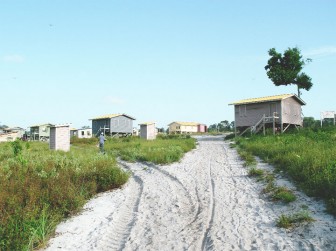
The forest thinned and a hill covered with greenery and papaw trees rose up from the surrounding land. It was the shell mound. Remarkable artifacts used by prehistoric Amerindians have been found by archaeologists here, but the ancient refuse heap has remained relatively undisturbed. Thousands of black and white molluscs’ shells form an enormous heap in the forest on which papaw and other trees grow. Bits of bone lie on the surface at the spot that archaeologists excavated and Andron unearths a few more pieces as he digs at the shells.
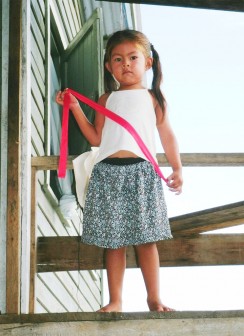
The shell mound has excited some in the community of New Haven and there are plans to establish a tourist centre. “I believe it is the largest shell mound in the country,” exclaims Vanessa D’Aguiar. She said that archeologists who visited last year found and collected a lot of things. “When they dig, they find like tools that the Amerindians use to use, they find fireside… they find skeletons of people buried over there,” she said. “I believe they find one that was beheaded and one that get shoot with an arrow.” A skeleton of a big fish was also found, she stated. “It got a lot of history. They suppose to come back this year.”
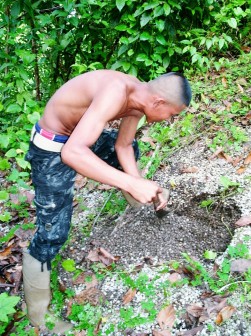
Surrounded by thick jungle, the shell mound seems to be miles from anywhere, but it is quite close to New Haven. New Haven seems far from everything else. Getting there involves taking a boat from Charity and heading up the ‘highway’ that is the Pomeroon River to Siriki, then speeding up the tiny, winding three-mile canal to the foot of a hill atop which lies the pink, green, grey and blue houses of New Haven.
As villages go it is remarkably young, having started in July 2009 as a Food for the Poor project for families whose lives were constantly disrupted by the frequent flooding of the Pomeroon River.
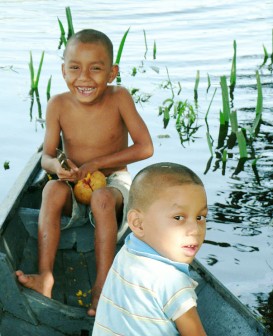
D’Aguiar is the chairperson for the community and by December 2009, seventy houses, a bond and a multipurpose building had been constructed. The village was opened on January 17, 2010 and government constructed a water system. 70 families were catered for but only 30 live there now because the school has not yet opened. Most depend on farming. “Most is like poor people who hadn’t like a proper house or so to live in and they were glad because they built the house and we hadn’t to pay for it,” D’Aguiar said. “It is a quiet area and you don’t have to frighten with this flooding. The rain could just finish falling and you could walk all around,” she said with a laugh. “No mud.”
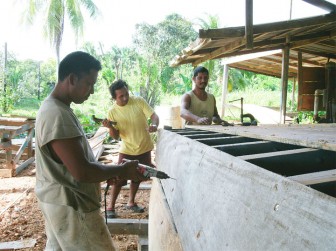
On a late afternoon in January, there was scarcely anyone walking the white sandy streets of New Haven though Brazilian music pounded from a home. Residents use small generators for electricity.
The village has a plan for development and is involved in several projects. As chairperson, D’Aguiar has to ensure that all runs smoothly. She is also the midwife for the community. The village is working on a sawmill project having been given a portable sawmill and chainsaws by Food for the Poor. They have also built a boat for which they are expecting an engine soon and have also received a tractor.
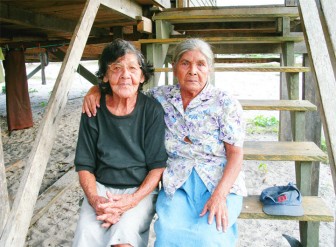
D’Aguiar said that they are also supposed to start a farming and poultry project. She said that while cooperation was good at the beginning, it is more difficult now, but she is determined to forge ahead. “You can’t bother with dem things. You just have to overlook them sometimes, do what you have to do,” she said.
Villagers said that it is better, living away from the flood-prone areas. Andron, 20, lived there from the inception but also works in the interior as a gold miner. D’Aguiar says there is no crime but they have formed a policing group and what arises mostly are disturbances by some from out of the area who misbehave. They are quickly put out of the community.
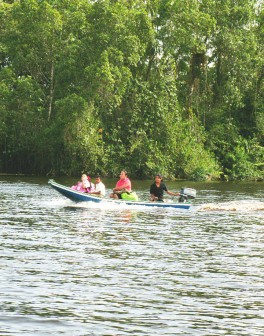
“Moodooo,” the shout echoes in the surrounding forest. “Somebody come foh see you.”
“Yes” comes the response from a little room brightly lit with sunshine.
“Watch me bring somebody foh see you.”
“Who is dah?”
“A visitor”
Elda Williams is 88 and very short. She is enjoying a snack. “I like New Haven. Me na like in the river, too much water and mud,” she laughs. “Me use to live right in the river but one ah me son deh in the place and me get this place here, this house and you know me like foh deh me alone. You know old people.” People in this small community are neighbourly and look out for each other. Edna is Arawak. She likes New Haven because it is dry. Being dry seems to be a big plus here. “Even if rain fall and it over, you could still go walk and yuh foot nah gon mess up. That’s why I like up here,” she said.
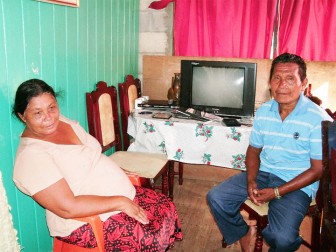
The spry woman survives on her pension, her garden and occasional help from relatives. She plants fruits like papaw, soursop, oranges, carambola, pineapple and assorted other crops like vegetables, and sorrel in her garden.
Edna and her sister Onica Fredericks, 72, are the two oldest persons in the village. They laugh as they pose for a photo. Everyone here, it seems, likes to laugh. Even Ronald Smith sitting at the waterside with his dog Ringo waiting for his family to return from shopping at Charity.
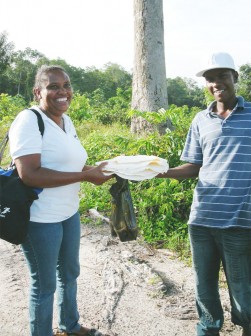
The tide has risen and in the late afternoon, Samuel the boatman, speeds through the twists and turns of the narrow canal now filled with water as the sun sets. When the tide is low, engines have to be used with care and sometimes paddles have to be used because of the shallowness of the canal.
New Haven, named after the donor’s grand-daughter, Haven, is only a part of the larger community of Siriki. Siriki proper is a line of houses and farms strung out along both banks of the Pomeroon River.
Most persons here are farmers and James Smith, 54, is no exception. He has dreams of expanding his farm and has moved a long way towards achieving this goal. He has lived in Siriki for 43 years, clearing the bush and digging drains after purchasing the land. He now cultivates a number of crops and excitedly talks of the time all the plants that he has cultivated will start to produce. He has big plans. “That’s the goal, foh go more farther with the farm. I planning to extend the farm more and more big,” he said. But the transport for the land is hampering his advancement and after years, the authorities are still to complete the process and hand him the document, he said.
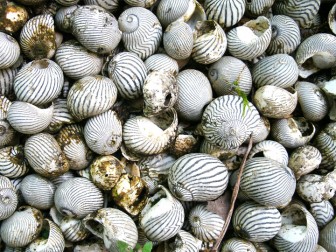
Smith likes Siriki. The land is fertile, it is quiet and there is no crime, he said. There is also the nursery and primary schools and a health centre. There are shops but many things are expensive and so like most, he buys monthly rations at Charity. Like the others, he uses a generator at nights for electricity.
The community has some furniture-makers but the majority are farmers and groves of oranges and other citrus can be seen as boats – the vehicles of the Pomeroon – traverse up and down every few minutes on the dark waters of the river.
The Kellawans are involved in boat-building. Calvin Kellawan and his brother, Gerald, say they have been building boats for 25 years for persons countrywide. They make the wooden vessels on order and most are commercial passenger boats. A 27 foot by 9 foot boat would usually take about 12 days to build and costs about $700, 000. Calvin says they use strictly silverballi but notes that there are different types. They work according to the design provided by the Maritime Administration which specifies the types of vessels for use in different parts of the country. Calvin said that they usually make about two boats every month. “Most of the time you get work,” he said.
While their uncles build, Jared and Adriel Kellawan are mostly involved in repairs. At their workshop, dominated by two huge music boxes, the teens scrape the bottom of one vessel. “Is only boat wuk we can depend pon foh make a living,” Jared, 19, explains. He said that they mostly get boats to repair but sometimes persons order boats for personal or farm use. “We does [build] personal boat, like you know, farm boat. We don’t get no big [boat to build].”
Jared said that he plans to do something different in the future. He said that they went to secondary school but “we never go far inside because of finances” and they then took up boat-building. He has lived in Siriki since birth and likes the water and the boats. “We ain like the roadside cause it too busy foh we,” he said. “Here suh is a normal, nice lifestyle man, you catch fish, you eat… nice, local, we like it man.”




